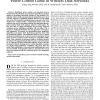Free Online Productivity Tools
i2Speak
i2Symbol
i2OCR
iTex2Img
iWeb2Print
iWeb2Shot
i2Type
iPdf2Split
iPdf2Merge
i2Bopomofo
i2Arabic
i2Style
i2Image
i2PDF
iLatex2Rtf
Sci2ools
114
click to vote
TON
2008
2008
Stochastic learning solution for distributed discrete power control game in wireless data networks
Distributed power control is an important issue in wireless networks. Recently, noncooperative game theory has been applied to investigate interesting solutions to this problem. The majority of these studies assumes that the transmitter power level can take values in a continuous domain. However, recent trends such as the GSM standard and Qualcomm's proposal to the IS-95 standard use a finite number of discretized power levels. This motivates the need to investigate solutions for distributed discrete power control which is the primary objective of this paper. We first note that, by simply discretizing, the previously proposed continuous power adaptation techniques will not suffice. This is because a simple discretization does not guarantee convergence and uniqueness. We propose two probabilistic power adaptation algorithms and analyze their theoretical properties along with the numerical behavior. The distributed discrete power control problem is formulated as an -person, nonzero ...
| Added | 15 Dec 2010 |
| Updated | 15 Dec 2010 |
| Type | Journal |
| Year | 2008 |
| Where | TON |
| Authors | Yiping Xing, Rajarathnam Chandramouli |
Comments (0)

